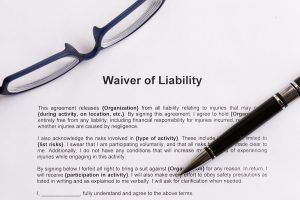Waivers Are Not Foolproof
 Michael Babboni
Personal Injury
Anyone that’s ever participated in a physical activity where there is some risk of injury is probably familiar with the process of signing a waiver. A waiver is a contract that a person voluntarily signs that protects a service provider from the danger of a lawsuit should the person signing the contract suffer an injury. In other words, by signing a waiver, whether you are aware of it or not, the waiver itself states you agree to “waive” any right you had to suing someone in the event that something bad happens.
Michael Babboni
Personal Injury
Anyone that’s ever participated in a physical activity where there is some risk of injury is probably familiar with the process of signing a waiver. A waiver is a contract that a person voluntarily signs that protects a service provider from the danger of a lawsuit should the person signing the contract suffer an injury. In other words, by signing a waiver, whether you are aware of it or not, the waiver itself states you agree to “waive” any right you had to suing someone in the event that something bad happens.But is that actually the end of it? Once you’ve signed the waiver, have you surrendered all your legal rights? The answer, fortunately, is “no,” but there are a lot factors in play that determine when a waiver protects a service provider and when it doesn’t.
Reasonable Risks
On the one hand, waivers are very good at protecting companies and services from what might be considered reasonable risks. Many gyms and fitness centers around America, for example, require members to sign a waiver, as lifting weights, participating in aerobics or other exercise classes, or using any number of training machines all expose people to a certain amount of physical risk. And while people are usually advised to consult a doctor before undergoing any regular exercise regimen, few actually follow this advice, and a gym or fitness center has no legal rights to enforce medical exams to its members. Thus, the idea of getting sprains, strained muscles, or injury from trying to lift a barbell you’re not ready for, or participate in an exercise class you were advised against is, to some degree, expected. The whole point of exercise is to your subject your body to a controlled amount of stress and physical strain. There is a very real risk, depending on your physical health and the type of exercise you participate in, that you might sustain an injury.
In such cases, a sprained muscle, or torn ligament is quite likely to be mentioned in the waiver you signed, and therefore, your odds of being able to sue for the type of injury specifically accounted for in a waiver is low. This is definitely one of those, “you knew what you were getting into” type situations.
However, when it’s something that you didn’t sign on for, that changes things a lot.
Negligence Is Still Illegal
If you signed a waiver at a gym and experienced a sprained muscle as a result of ignoring personal trainer advice and working out too heavily, the waiver is going to protect the gym. However, if you signed a waiver at the gym and gym itself ignored a problem furnace heating the building that led to a gas explosion in which you got injured, that waiver you signed is unlikely to provide the gym with any legal protection. In such a case, the injury you sustained in the event of a gas furnace mishap is not due to you exercising, or doing anything covered in the waiver. This is a more “traditional” case of negligence, where the gym had a legal obligation to ensure its facilities were operating normally and safely. If the gym’s staff ignored the warning signs that there were problems with the furnace, resulting in a gas leak related accident, you can—and should—seek legal action for this.
A waiver does not render a company or service legally “immune” to any and all injury a person may receive. However, in order to determine exactly what your legal options are in such a case, you should consult with an experienced personal injury lawyer in St. Petersburg in order to find out where a waiver’s legal protection begins and ends with regards to your specific case.
